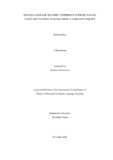
Please use this identifier to cite or link to this item:
https://hdl.handle.net/20.500.14301/498| Title: | English Language Teachers’ Experience of Project-Based Language Teaching in Bangladesh: A Narrative Inquiry |
| Authors: | Dutta, Krishna |
| Citation: | Dutta,K.(2024). English language teachers’ experience of project-based language teaching in Bangladesh: A narrative inquiry. |
| Issue Date: | Nov-2024 |
| Publisher: | Kathmandu University School of Education |
| School: | SOED |
| Department: | DOLE |
| Level: | Masters |
| Program: | Master of Education in ELT (2 years) |
| Abstract: | Project-Based Language Teaching (PBLT) is an intensively studied, widely used, and critically examined innovative teaching approach in schools worldwide. It is a crucial pedagogical approach for preparing L2 learners to acquire the target language effectively. However, we still observe a teacher-led, conventional pedagogical practice in the EFL classrooms of Bangladesh, accompanied by a memorization-based exam system, which results in boredom in teaching-learning activities and superficial learning outcomes from learners. This research explored how activities in our English language class can be made interactive, engaging, and learner-centered by adopting PBLT. The main objective of the dissertation was to investigate how secondary EFL teachers in Bangladesh perceive PBLT and how they encountered challenges in implementing the approach. Using the narrative inquiry as a research methodology, I collected the stories of seven secondary-level English teachers through interviews. After the analysis of the stories collected from the research participants, the research found that adopting this exploratory learning method equips the L2 learners with a varied set of skills, overarching four language skills, 21st-century skills, or soft skills such as interpersonal skills, creativity, critical thinking, problem-solving skills, and technological proficiency. The research revealed how to turn the concept of PBLT into a tangible reality in the Bangladeshi context using social constructivism as a theoretical referent. According to the teachers’ anecdotes, actualizing experiential learning using project based language teaching methods in the curriculum is impossible if we don’t address the roles and functions of the stakeholders - learners, parents, teachers, school heads, and teachers’ educators. A comprehensive review and analysis of the related literature focused primarily on teachers’ roles in implementing PBLT. However, this research highlights the need for a deeper investigation into aspects such as teacher beliefs, teacher reasoning, and teacher cognition in planning and designing the PBLT tasks that align with the learners’ needs within the socio-economic context of Bangladesh. |
| URI: | https://hdl.handle.net/20.500.14301/498 |
| Appears in Collections: | Research Report |
Files in This Item:
| File | Description | Size | Format | |
|---|---|---|---|---|
| OK Krishna Dutta_ Dissertation of final version _after defense.pdf | 1.96 MB | Adobe PDF |  View/Open |
Items in DSpace are protected by copyright, with all rights reserved, unless otherwise indicated.